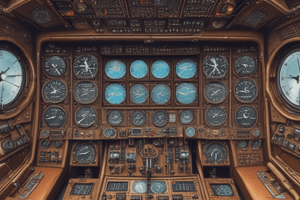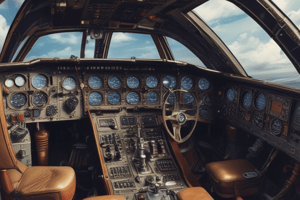Podcast
Questions and Answers
Which instrument is primarily used to measure the aircraft's vertical speed?
Which instrument is primarily used to measure the aircraft's vertical speed?
- Vertical Speed Indicator (correct)
- Airspeed Indicator
- Heading Indicator
- Attitude Indicator
What causes the altimeter to need calibration during a flight?
What causes the altimeter to need calibration during a flight?
- Changes in atmospheric pressure (correct)
- Changes in aircraft speed
- Changes in altitude only
- Changes in the aircraft's weight
Which of the following is not part of the '6 pack' flight instruments?
Which of the following is not part of the '6 pack' flight instruments?
- Heading Indicator
- Turn Coordinator
- Airspeed Indicator
- Slip Indicator (correct)
Gyroscopic instruments are especially important for which of the following functions?
Gyroscopic instruments are especially important for which of the following functions?
Which instrument is included in the category of pitot-static instruments?
Which instrument is included in the category of pitot-static instruments?
The Altimeter uses data from which measurement to indicate altitude?
The Altimeter uses data from which measurement to indicate altitude?
Which of the following instruments does not use gyroscopic principles?
Which of the following instruments does not use gyroscopic principles?
What is the function of the Turn Coordinator in flight instruments?
What is the function of the Turn Coordinator in flight instruments?
What does the airspeed indicator measure?
What does the airspeed indicator measure?
What phenomenon allows gyroscopic instruments to maintain their relative position in space?
What phenomenon allows gyroscopic instruments to maintain their relative position in space?
At what rate do gyroscopic instruments experience drift due to the Earth's rotation?
At what rate do gyroscopic instruments experience drift due to the Earth's rotation?
What does the turn coordinator indicate when the black circle moves toward the right?
What does the turn coordinator indicate when the black circle moves toward the right?
What does the attitude indicator show?
What does the attitude indicator show?
What visual sections does the attitude indicator use to represent sky and ground?
What visual sections does the attitude indicator use to represent sky and ground?
What role does the heading indicator play for an aircraft?
What role does the heading indicator play for an aircraft?
What is the primary function of the primary flight display (PFD)?
What is the primary function of the primary flight display (PFD)?
Flashcards
Pitot-static Instruments
Pitot-static Instruments
Instruments that use air pressure to measure altitude, vertical speed, and airspeed.
Altimeter
Altimeter
Measures the aircraft's altitude relative to atmospheric pressure.
Vertical Speed Indicator (VSI)
Vertical Speed Indicator (VSI)
Indicates the rate of climb or descent.
Airspeed Indicator (ASI)
Airspeed Indicator (ASI)
Signup and view all the flashcards
Gyroscopic Instruments
Gyroscopic Instruments
Signup and view all the flashcards
Attitude Indicator (AI)
Attitude Indicator (AI)
Signup and view all the flashcards
Heading Indicator (HI)
Heading Indicator (HI)
Signup and view all the flashcards
Turn Coordinator (TC)
Turn Coordinator (TC)
Signup and view all the flashcards
Airspeed Indicator
Airspeed Indicator
Signup and view all the flashcards
Turn Coordinator
Turn Coordinator
Signup and view all the flashcards
Attitude Indicator
Attitude Indicator
Signup and view all the flashcards
Heading Indicator
Heading Indicator
Signup and view all the flashcards
Drift (Gyroscopic)
Drift (Gyroscopic)
Signup and view all the flashcards
Primary Flight Display (PFD)
Primary Flight Display (PFD)
Signup and view all the flashcards
Study Notes
Flight Instruments
- The 6-pack flight instruments are the initial set student pilots learn.
- These instruments include: Airspeed Indicator (ASI), Altimeter, Attitude Indicator (AI), Heading Indicator (HI), Turn Coordinator (TC), and Vertical Speed Indicator (VSI).
Pitot-static Instruments
- Pitot-static instruments derive data from relative air pressure.
- These instruments extrapolate metrics like altitude and speed.
- Included instruments are the Altimeter, Vertical Speed Indicator, and Airspeed Indicator.
Altimeter
- Indicates aircraft altitude relative to current atmospheric pressure.
- Pressure changes at different altitudes affect altimeter readings.
- Altimeters need calibration using weather forecasts at stations located 100 nautical miles within the flight path, especially in areas with rapidly changing atmospheric pressure.
Vertical Speed Indicator (VSI)
- Measures the rate of ascent or descent of the aircraft.
- The VSI compares the airflow rate through a metered hole to the ambient outside pressure.
Airspeed Indicator (ASI)
- Measures the aircraft's speed, providing readings in knots (nautical miles per hour).
- The ASI uses pressure at the pitot tube, which is generated by the aircraft's forward motion through the air.
Gyroscopic Instruments
- Utilize spinning gyroscopes and gimbals to track aircraft attitude and headings.
- Gyroscopic instruments aid in maintaining pilot orientation.
- Common gyroscopic instruments include: Turn Coordinator, Attitude Indicator, and Heading Indicator.
Turn Coordinator
- Shows if the aircraft is slipping or skidding during turns.
- The black circle's position relative to the instrument's frame indicates the need for rudder adjustments for coordinated turns.
Attitude Indicator
- Displays the aircraft's attitude (pitch and roll) relative to the horizon.
- The instrument shows a blue area for the sky and a brown area for the ground.
- Movements of the aircraft related to pitch and roll are reflected in the positions of the brown and blue sections.
Heading Indicator
- Acts as a compass, graphically indicating the aircraft's heading (direction).
- The aircraft graphic on the instrument shows the current direction of travel.
Primary Flight Display (PFD)
- A consolidated display that combines the functions of several traditional flight instruments.
- Modern aircraft use PFDs to provide pilots with a concise representation of aircraft data.
Studying That Suits You
Use AI to generate personalized quizzes and flashcards to suit your learning preferences.




